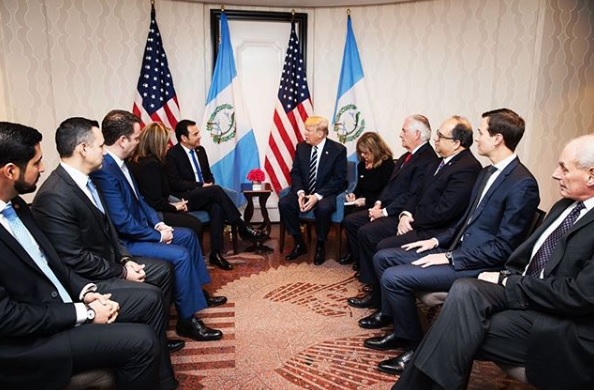By Anthony W. Fontes*

Guatemalan President Jimmy Morales meets with U.S. President Donald Trump in February 2018. / Executive Office of the President of the United States / Wikimedia
Guatemalan President Jimmy Morales’ announcement last month that he would not reauthorize the joint Guatemala-United Nations anti-corruption commission to remain in the country apparently was made with confidence that President Trump would approve, or at least turn a blind eye. Morales’ gambit followed months of public threats against the International Commission against Impunity in Guatemala (CICIG), which has been investigating and prosecuting high-profile organized crime and corruption cases for over a decade.
- His attempt to revoke CICIG’s authority and refusal to allow CICIG’s highly respected lead prosecutor, Iván Velásquez, to re-enter Guatemala after a trip to the United States are widely understood as intended to halt investigations into Morales’ own alleged illegal campaign financing during the 2015 presidential election. Even after Guatemala’s Constitutional Court – the nation’s highest judicial authority – ordered Morales to allow Velásquez entry, the president refused to budge.
- Some U.S. politicians have joined in the international condemnation of Morales’ efforts – 23 members of the U.S. Senate and House wrote a letter to Secretary of State Pompeo asserting that he “must counter” the maneuver. But the Trump administration has remained largely silent; Pompeo in early September reiterated U.S. “support for Guatemalan sovereignty” – code for a hands-off policy – and, using words similar to those Morales has used in advocating dilution of CICIG’s mandate, announced his backing for a “reformed CICIG.”
Several explanations for Washington’s soft approach to Morales’ action have emerged. Some pundits muse that the administration is repaying him for relocating the Guatemalan embassy in Israel to Jerusalem when the United States did. Others opine that Trump fears pushing Guatemala into China’s arms amid reports that it will follow El Salvador’s recent decision to break relations with Taiwan. Yet another, less strategic and more personal explanation might illuminate the equivocation – that Trump simply empathizes with Morales because they have a lot in common.
- Both first emerged in the public eye as TV personalities. While Trump was building his brand on “reality TV,” Morales hosted a popular daytime talk show, where he became known for lowbrow comedic antics that included blackface. In their campaigns, they fed on simmering discontent about the corruption of the political establishment, and trumpeted their lack of political experience as a prime reason to vote for them. They both defeated the former first ladies of left-leaning presidents considered by large swaths of their electorates as corrupt.
- More importantly, both presidents face far-reaching criminal investigations that have cast long shadows over their first years in office. Despite Trump’s vociferous denials to the contrary, the Special Counsel investigation into his campaign’s possible collusion with Russian efforts to influence the 2016 election has been a constant thorn in his side. CICIG, whose investigations into former President Pérez Molina were pivotal to his arrest and impeachment, has represented an existential threat to the Morales administration since the day he took office in 2015. CICIG’s work put his son and brother behind bars for fraud. (Trump’s son and son-in-law are reportedly under investigation too.) CICIG has doggedly pursued investigations against Morales and his supporters in Congress for illegal campaign financing, among numerous other charges.
The two presidents’ efforts to resist and deride the investigations into their activities expose perhaps the most striking (and disturbing) of their shared affinities. To protect themselves, they appear willing to tarnish and undermine public institutions integral to democracy and law and order. Trump attacks the free press and the FBI as “deep state” conspirators. Morales has aligned with members of the Guatemalan Congress to give immunity from prosecution to politicians in office accused of a laundry list of crimes, contravening a fight against powerful criminal organizations embedded in government. By violating decrees by Guatemala’s Constitutional Court, Morales has placed his administration on a collision course with the nation’s constitutional order.
- The potential long-term damage to democratic institutions suggests that the “democratic wave” that swept across the Americas in the second half of the 20th century has crested. Under the Trump administration, the United States now risks becoming a beacon for anti-democratic politicians like Morales across the hemisphere, giving political cover and guidance to those who would hasten democracy’s demise for the sake of power. The rule of law in liberal democracies is predicated on transparency and accountability – and is threatened by executive intimidation of institutional checks and balances.
October 2, 2018
*Anthony W. Fontes is an Assistant Professor in the School of International Service at American University.
